Shuttered by Covid: The end of Dagenham Sunday Market
- Published
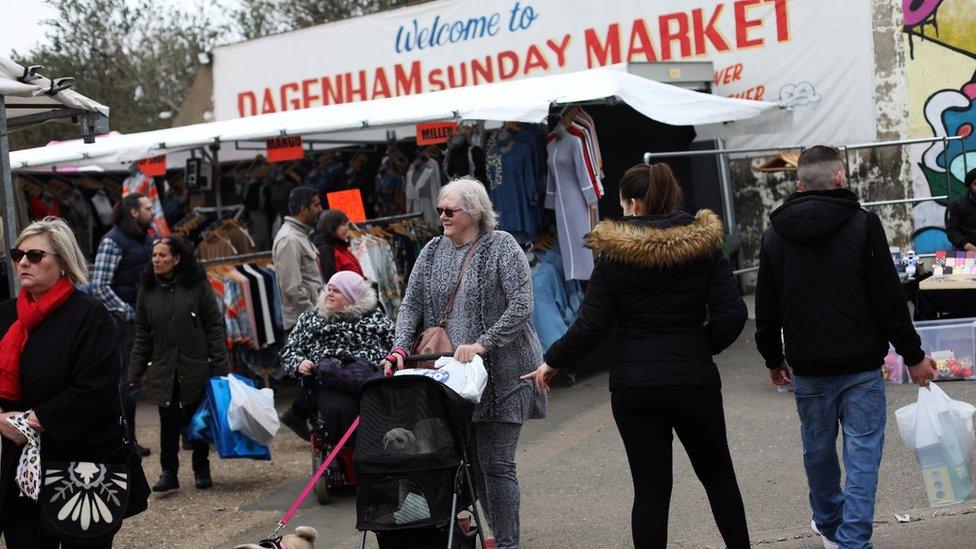
Thousands of people shopped at Dagenham Sunday Market every week
For almost two decades, an empty plot of land on the outskirts of London was transformed every weekend into one of the UK's biggest markets. Traders travelled from across the country for the chance of selling their goods to thousands of customers searching for bargains and banter. Then coronavirus changed everything.
Six months ago, Dagenham Sunday Market ceased trading and it won't now reopen. The community has lost a much-loved market and its traders are having to adapt to the future.

Sunday was the highlight of Bill Watson's week.
The veteran tradesman would wake up early and drive to Dagenham Sunday Market, on the outskirts of London, before 06:00 to set up his stall selling memorial plaques and artificial flowers.
As a fixture at the market for more than a decade, his usual spot was in a prime position - next to a catering van where people queued for their morning cup of tea. He knew all of the traders around him well, and looked forward to the weekly banter.
"On my right I had somebody selling tools. Opposite me was ladies' fashion, on their left was someone selling jewellery and to the right someone selling hats and sunglasses. The guy next to him was selling sportswear, the one next to him was selling make-up," he recalls.
From the moment the market opened, Bill would be busy haggling with customers and chatting with anyone who stopped at his stall.

Bill Watson sold artificial flowers at the market
Like those around him, he thrived in the hustle and bustle of the market.
"You walk down the stalls and you hear music coming from this one, music coming from that one. You get the smell of the flipping burgers and the onions. It had everything," he says.
But earlier this year, Bill's beloved Sundays came to an abrupt end when regulations to curb the spread of coronavirus saw the market close its doors. In a letter posted on social media in June, the market's owners announced the "end of an era".
"We've managed to outlast all markets of our kind but we will sadly not outlast Covid-19," the letter said. "We will miss the banter, the East End atmosphere and not forgetting the amazing bargains."
Dagenham Sunday Market had closed for good.
The beginning
Co-owner Frank Nash, 60, says he got into the market trade "by accident" when a cloth-maker he was working for in his 20s fell into liquidation.
"The only way to get rid of a lot of the stock was through the markets," he says, "So I started doing that and then I came up with the idea of running them."
Frank and a school friend opened their first market in Essex's Canvey Island in 1986. From there, he says it became "a bit of a travelling show", moving to London Docklands and then to Dagenham, where it eventually settled on the 20-acre site near the River Thames that it remained on until March.
By the time it closed this summer, Dagenham had become one of the biggest markets in the UK, boasting 10,000 to 15,000 customers every Sunday. Last year, a BBC TV series called Good Morning Dagenham followed the traders.

Frank (front) says the market would not work with social distancing regulations
Frank says the secret to Dagenham's success was that it always retained the spirit of a traditional East London market.
"We were a throwback. At one time, it was a social thing to go shopping. In the fast world we live in, it's not social anymore - it's something to just get out the way," he says. "Our formula was loads of people crammed in, friendly atmosphere, lots of banter."
The market
Hundreds of traders worked at the market every Sunday, from butchers to toy auctioneers.
"It was unique. It was very much like the markets I'd worked at 30 or 40 years ago," says veteran London clothes trader John Grainger. "It was like a proper East End traditional market. It still had that proper buzz and atmosphere. The customers were proper East London, Essex, Kent."
Another long-term trader, Matt Firman, described Dagenham as a community where "everyone helps each other out".
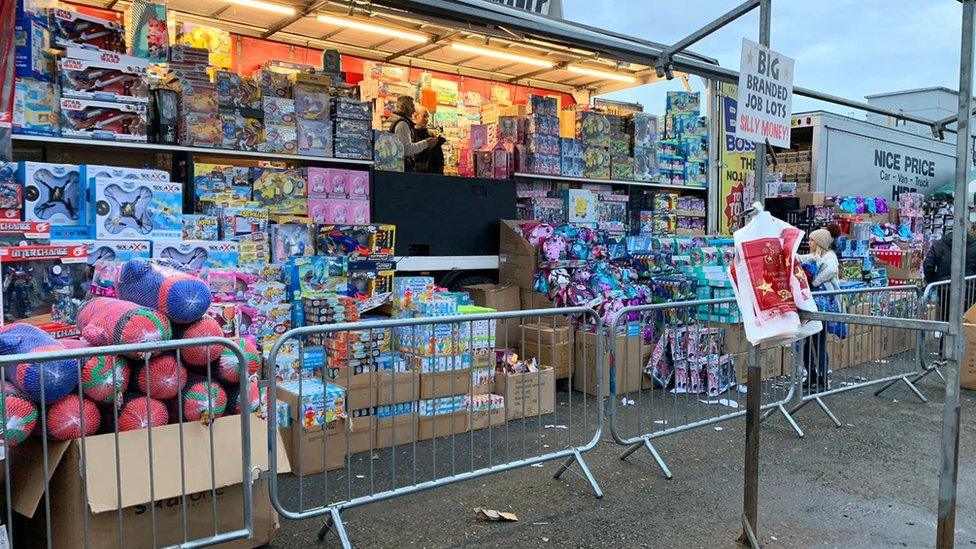
The Christmas toy auction was a popular feature of the market
He was best known at the market for his Christmas toy auction and would spend months building his stock for the festive rush.
"We'd bring two lorries there full of toys. I'd be there in the lorry and I'd pick up say five toys. I'd describe the toys and say how much they were in the shop. It'd be like 'all that there comes to £60, but we're not going to charge you 60, 50, 40, 30, not even 20. Who's got a tenner?' Then all the hands would go up for a tenner," he recalls.
Like other traders, ladies' fashion seller Julie-Ann Scott worked at several markets during the week. But Dagenham was "one of its own".
"People used to just come and have a chat even if they didn't buy - you got to know everyone. You got to know their families. You got to know what they went through in life," she says.
The closure
When it temporarily stopped trading in March, everyone thought the market would be up and running again by September. Its 19-year run on the same plot was due to finish at the end of the year, but Frank says he had hoped to find a new location, before "the pandemic stopped us in our tracks".
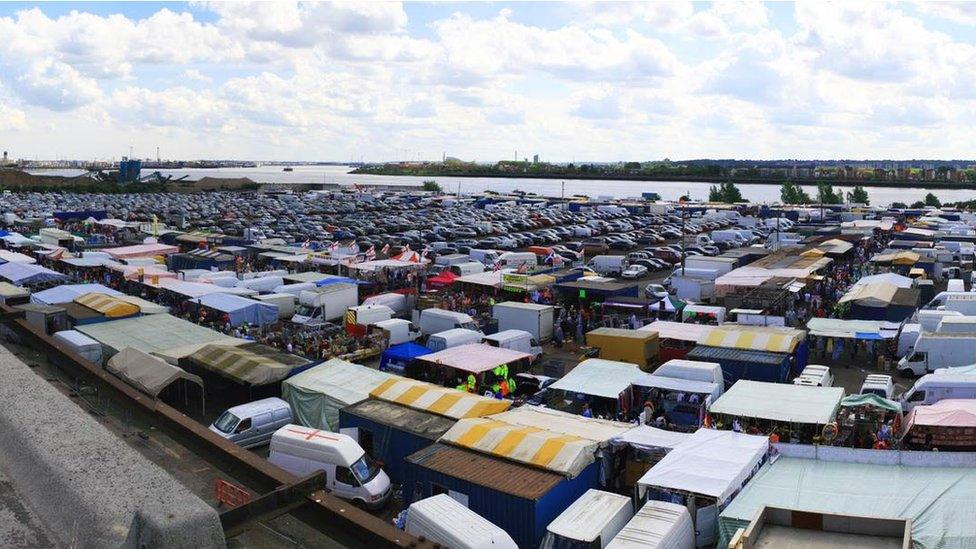
Dagenham Sunday Market had been on the same plot for about 19 years
"The beauty of the place is that old fashioned shoulder-to-shoulder hustle bustle. You start diluting that and... it just wouldn't be the same. People don't want to see a limping dog of a business," he says of the decision to shut Dagenham for good. Although we're a market, we're more like a mass gathering. The last thing you want is to be shut down or be some sort of hot spot for the virus."
Frank says ringing the traders in June to break the news was like "telling someone over and over again that someone in their family has died".
"None of us saw it coming. I think I'm still in shock," Julie-Ann said in an interview this summer. "We didn't get to say goodbye."
Customers learned of the news when the statement was posted on Facebook. Its importance to the local community was cemented in thousands of responses mourning its closure.
"Absolutely gutting for everyone - I have been visiting since I was a child and now with my own children," one wrote, in a sentiment echoed by others.
"It's been a huge part of my life," another said, while a third wrote simply: "I will miss all my friends."
The future
Six months since the last day of trading at Dagenham Sunday Market, its owners and traders are trying to adjust to a new way of working.
Frank has now launched an app, Dagenham Market 24/7, connecting the market's traders and customers. So far, he says about 18,000 people have downloaded it.
"At the moment it's like a directory, but we're trying to make it so people can make videos and sell within it like on the market," he says.
After decades of spending his Sundays at the market, Frank says it's "weird" to have free time, but that he's "quite enjoying" it.
Many of the ex-traders are experiencing similar feelings.
"I cut the grass the other Sunday and I thought to myself 'I've never done this before. I've never cut the blinking grass on a Sunday,'" Bill says.
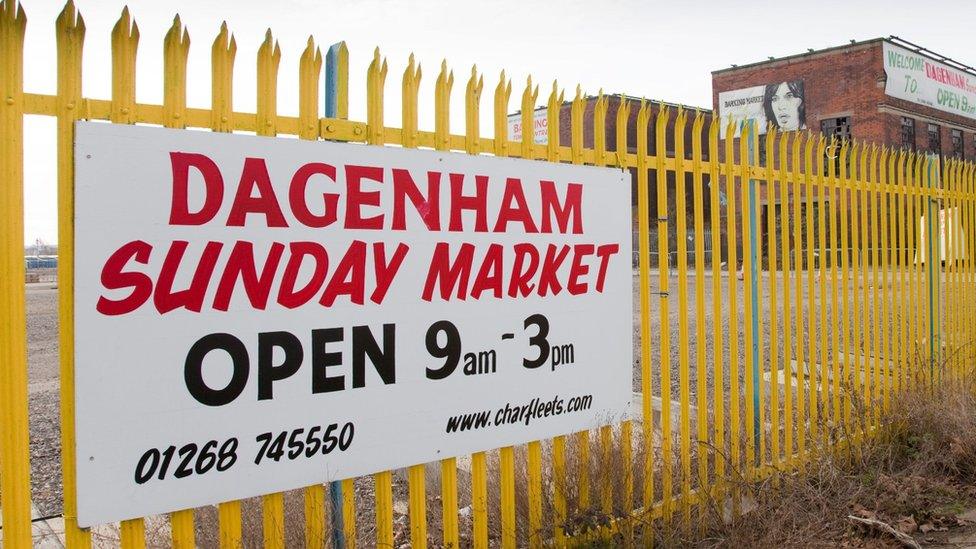
Dagenham Sunday Market was located on an empty plot of land near the River Thames
He and other Dagenham traders have also turned their attention online in a bid to make up for the lost income - creating websites, posting social media videos and offering home deliveries.
While he is still missing the market, he says a lot of his customers have now found his Affordable Memorials company online.
"My back was against the wall and I changed how I was doing things. I'm on Facebook now. When I do a crazy little sing-song on Facebook, I want people to say 'oh there he is'. Then they'll buy from you there," he says.
"We're entrepreneurs. Del Boy was bang on: 'He who dares...'"
- Published24 May 2020
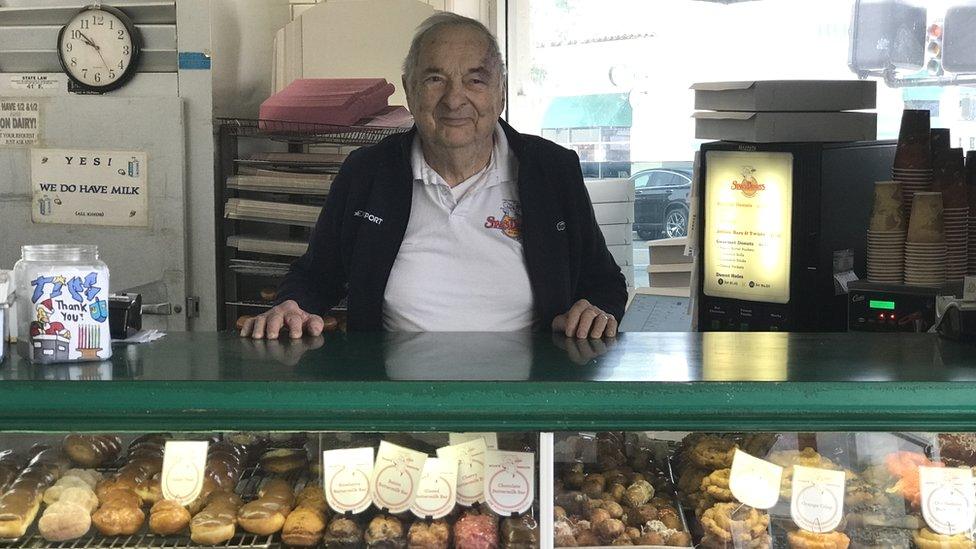
- Published5 July 2022

- Published15 September 2020
